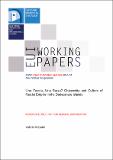Una Faccia, Una Razza? Citizenship and the culture of fascist empire in the Dodecanese Islands
Abstract
How did Italy imagine its ‘Greek’ occupied territories of the inter-war period? This paper takes the Dodecanese Islands as its privileged site for discovering the Fascist regime’s attitudes toward its nonAfrican but, nonetheless, colonially occupied subjects of the Mediterranean—subjects who may have been the same in face, but were different in race. It examines the creation of a special form of citizenship, cittadinanza egea italiana, as a political instrument to encourage imperial loyalty and to initiate a project of cultural, but also ethnic, transformation in the islands. By examining in particular how Fascist Italy made use of the Second Treaty of Lausanne (1923), when integrating Dodecanese subjects as Italian nationals, the paper shows how Fascist governance’s struggle to establish hierarchies and racial differences between Italians and its occupied subjects in the eastern Mediterranean never reached a satisfactory resolution and eventually gave way to Anti-Semitic policies and a hardline approach to colonial occupation.
Citation
McGuire , V E 2014 ' Una Faccia, Una Razza? Citizenship and the culture of fascist empire in the Dodecanese Islands ' MWP Red Number Series , no. 4 , vol. 2014 , European University Institute Working Papers .
Type
Working or discussion paper
Collections
Items in the St Andrews Research Repository are protected by copyright, with all rights reserved, unless otherwise indicated.

